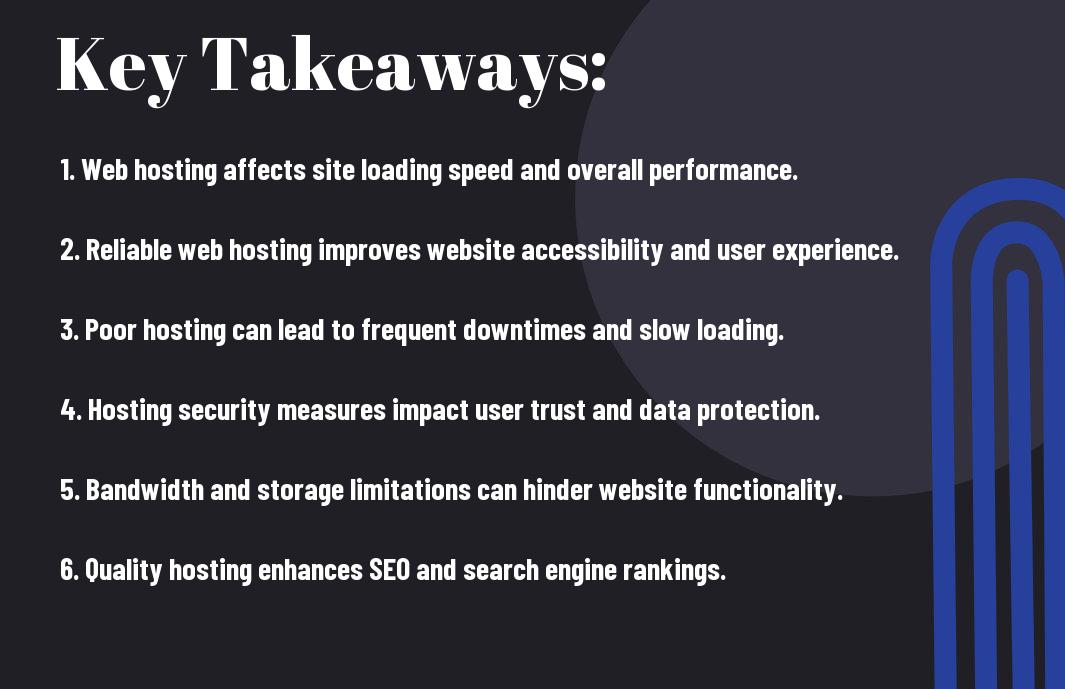Have you ever considered the profound effect your web hosting provider can have on the usability of your website? Your choice of web hosting company can significantly influence the loading speed, uptime, and security of your site, ultimately shaping the experience for your visitors. Slow loading speed due to poor hosting can turn away potential customers while frequent downtime can harm your search engine rankings. On the other hand, choosing a reputable web hosting provider can improve your website’s performance and provide a secure and reliable online experience for your users. In this blog post, we will explore the critical impact of web hosting on your website’s usability and provide tips for choosing the right hosting provider for your website.
Key Takeaways:
- Server reliability: The uptime and downtime of a web hosting server directly impact website usability. A reliable web hosting service ensures minimal downtime, leading to a better user experience for website visitors.
- Page loading speed: Web hosting plays a crucial role in determining the speed at which web pages load. Fast loading times are essential for retaining visitors and improving usability.
- Support and security: A web hosting provider’s support and security measures can significantly impact website usability. Effective support and robust security protocols contribute to a smoother and more secure browsing experience for users.

Understanding Web Hosting
If you are new to the world of websites and online presence, understanding web hosting may seem like a daunting task. However, it is a crucial aspect of building and maintaining a successful website. In simple terms, web hosting is the storage and management of a website’s data and files on a server, which makes it accessible to users on the internet.
Definition and Types of Web Hosting Services
When it comes to web hosting, there are several types of services available, each catering to different needs and budgets. The main types of web hosting services include shared hosting, VPS hosting, dedicated hosting, cloud hosting, and managed WordPress hosting. Each of these services has its own advantages and disadvantages, and the choice largely depends on your website’s size, traffic, and specific requirements.
- Shared hosting: Your website shares server resources with other websites, making it the most economical option for beginners.
- VPS hosting: Virtual Private Server hosting provides more flexibility and control over your website’s resources.
- Dedicated hosting: With dedicated hosting, you have an entire server dedicated to your website, offering the highest level of performance and control.
- Cloud hosting: This type of hosting uses multiple servers to host your website, providing scalability and reliability.
- Managed WordPress hosting: Specifically optimized for WordPress websites, this type of hosting offers features such as automatic updates and security enhancements.
Perceiving the differences between these types of hosting services will help you make an informed decision for your website’s needs.
How Hosting Affects Website Performance
Your choice of web hosting can significantly impact your website’s performance. Factors such as server uptime, loading speed, and security measures all play a crucial role in providing a seamless user experience. A reliable hosting service will ensure that your website is accessible to visitors at all times, minimizing downtime and potential disruptions to your online presence.
Factors of Website Usability
Unlike other aspects of website design, the usability of your website is not solely determined by its look and feel. There are several key factors that can significantly impact the usability of your website:
- Page load speed – Slow loading websites can frustrate users and lead to high bounce rates.
- Reliability – Your website must be up and running 24/7, and a good web hosting service can help ensure this.
- Security – It is important to keep your website safe from cyber attacks and having a secure hosting provider is crucial for this.
Though the performance of your website is influenced by many factors, a good web hosting service can have a major impact on these factors and ultimately on your website’s usability.
User Experience (UX) Essentials
The user experience (UX) is a crucial aspect of website usability. Making sure that your website is easy to navigate, engaging, and provides valuable content to your visitors will enhance their overall experience and keep them coming back for more.
Metrics for Measuring Usability
One way to measure the usability of your website is by analyzing metrics such as page load times, time on page, bounce rate, and conversion rate. These metrics can provide valuable insights into how users interact with your website and help you identify areas for improvement.

Integrating Web Hosting and Usability
Your choice of web hosting has a direct impact on the usability of your website. From load times to reliability and user navigation, the hosting service you choose plays a critical role in how well your website functions and serves your visitors.
Optimizing Load Times and Reliability
When it comes to usability, fast load times and reliable performance are crucial. Slow loading pages can frustrate your visitors and lead to high bounce rates, negatively impacting user experience. Choosing a web hosting service with high uptime guarantees and fast server speeds is essential for ensuring your website is always accessible and performs well for every user.
Ensuring Seamless User Navigation
User navigation is another critical aspect of website usability. A well-organized and easily navigable site structure ensures that visitors can find the information they are looking for without frustration. The choice of web hosting can impact this by affecting site speed, which in turn can affect user navigation. If your site is slow to load, it can hinder the user’s ability to move between pages and find what they need efficiently.
Case Studies
To understand the direct impact of web hosting on website usability, let’s take a look at some real-life case studies that demonstrate the significance of this relationship:
- Case Study 1: A 2-second web page load time improvement resulted in a 7% increase in conversion rate.
- Case Study 2: A website’s bounce rate decreased by 50% after switching to a more reliable hosting provider.
- Case Study 3: Poor hosting led to a website being offline for 24 hours, resulting in a significant loss of revenue.
Success Stories: Boosting Usability Through Improved Hosting
By upgrading your web hosting, you can significantly enhance your website’s usability. Faster loading times, improved uptime, and better overall performance can lead to higher user satisfaction and increased engagement. Reliable hosting providers can empower your website to deliver a seamless user experience, ultimately boosting usability and achieving your business goals.
Lessons Learned from Poor Hosting Decisions
Choosing the wrong web hosting provider can have devastating effects on your website’s usability. Downtime, slow loading speeds, and security breaches can drive users away, leading to decreased engagement and potential loss of revenue. It’s crucial to carefully evaluate and choose a hosting provider to ensure optimal website usability and overall performance.
Best Practices in Web Hosting for Enhancing Usability
Despite the importance of web hosting in the usability of your website, not all hosting providers are created equal. When it comes to ensuring a positive user experience, there are certain best practices that you should follow to ensure that your hosting provider is contributing to, rather than detracting from, your website’s usability.
Choosing the Right Hosting Provider
When selecting a hosting provider, there are a few key factors that you should consider to ensure that your website’s usability is not compromised. Reliability and speed are crucial – you don’t want your website to be unavailable or slow to load, as this will frustrate your visitors and potentially drive them away. Look for a hosting provider that offers robust support, including 24/7 technical assistance, as this can be invaluable in resolving any usability issues that may arise. Additionally, consider the scalability of the hosting plan – as your website grows, you’ll want to ensure that your hosting can keep up with increased traffic and demand.
Ongoing Maintenance and Upgrades
Once you’ve selected a hosting provider, it’s important to stay on top of ongoing maintenance and upgrades to ensure optimal usability. Regularly update your website’s software and plugins to address any security vulnerabilities and ensure that everything is running smoothly. Additionally, monitor your website’s performance and address any issues that may arise, such as slow loading times or downtime. By staying proactive in your website maintenance, you can ensure that your hosting is positively contributing to your website’s usability.
Future Trends
For the future, there are several exciting trends to look out for in the world of web hosting and website usability. One important trend to keep in mind is the increasing speed and efficiency of web hosting services. The Benefits of Website Hosting with Web.com include faster load times, improved security, and better overall performance for your website.
Advances in Hosting Technologies
Advances in web hosting technologies are constantly being made, leading to enhanced website usability for you and your visitors. From the introduction of solid-state drives (SSD) to the adoption of cloud hosting, hosting providers are continuously finding new ways to improve speed, reliability, and security for your website. These advances are essential in ensuring a seamless and enjoyable user experience for your audience.
Anticipated Changes in Usability Standards
As the digital landscape continues to evolve, anticipated changes in usability standards will also impact website design and functionality. It is important to stay informed about emerging trends in mobile responsiveness, accessibility, and user interface design. Keeping up with these changes will allow you to adapt your website to meet the evolving needs of your audience, ultimately enhancing user satisfaction and engagement.
Conclusion: The Impact of Web Hosting on Website Usability
Summing up, the choice of web hosting can significantly affect the usability of your website. Factors such as page loading speed, uptime, and security all play a crucial role in providing a positive user experience. By selecting a reliable web hosting provider and ensuring your website is well-optimized, you can improve the overall usability of your site and keep your visitors satisfied. Remember, a faster and more secure website leads to higher user engagement and better conversion rates. So, when choosing a web hosting service, consider the impact it will have on the usability of your website for your audience.
FAQ
Q: What is the impact of web hosting on website usability?
A: Web hosting can significantly impact website usability as it influences site speed, uptime, and overall performance. Choosing a reliable web host is crucial for providing a positive user experience.
Q: How does web hosting affect website loading speed?
A: The quality of web hosting directly affects website loading speed. A slow host can cause delays in loading pages, leading to a poor user experience and potentially increased bounce rates.
Q: What is the importance of uptime in web hosting for website usability?
A: Uptime, which refers to the amount of time a website is accessible to users, is crucial for website usability. A reliable web host ensures high uptime, minimizing downtime and ensuring that the website is consistently available to visitors.
Q: Can web hosting impact website security and user trust?
A: Yes, web hosting plays a role in website security. A secure web host can provide features such as SSL certificates and regular security updates, enhancing user trust and safeguarding sensitive information.
Q: How does web hosting influence overall website performance and user satisfaction?
A: The impact of web hosting on website performance is substantial. A well-chosen web host can lead to faster load times, higher uptime, improved security, and ultimately, increased user satisfaction with the website.
CATEGORY:Uncategorized
